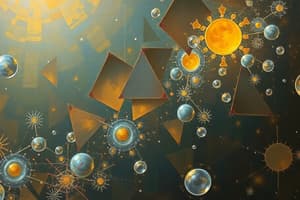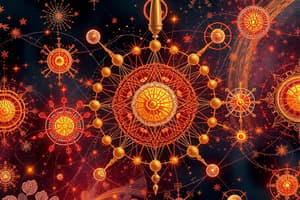Podcast
Questions and Answers
What factors related to luminosity are mentioned in relation to the LHC's production yield?
What factors related to luminosity are mentioned in relation to the LHC's production yield?
Factors of 2-4.
Which organization provided support for the research detailed in the acknowledgments?
Which organization provided support for the research detailed in the acknowledgments?
U.S. Department of Energy, Office of Science, Office of Nuclear Physics.
Name one of the authors acknowledged for helpful discussions in the research.
Name one of the authors acknowledged for helpful discussions in the research.
Ian Cloët.
What is one research project number mentioned in the acknowledgments?
What is one research project number mentioned in the acknowledgments?
What topic does R.D. Field and R.P. Feynman's work focus on as per the reference provided?
What topic does R.D. Field and R.P. Feynman's work focus on as per the reference provided?
Identify the main theoretical framework employed by D.A. Ross and C.T. Sachrajda in their research.
Identify the main theoretical framework employed by D.A. Ross and C.T. Sachrajda in their research.
Which process is associated with V.N. Gribov and L.N. Lipatov's publication?
Which process is associated with V.N. Gribov and L.N. Lipatov's publication?
According to M. Gluck and E. Reya, what do their findings relate to?
According to M. Gluck and E. Reya, what do their findings relate to?
What phenomenon is discussed in the context of flavor symmetry breaking?
What phenomenon is discussed in the context of flavor symmetry breaking?
What year was the publication by D.A. Ross and C.T. Sachrajda released?
What year was the publication by D.A. Ross and C.T. Sachrajda released?
Flashcards are hidden until you start studying
Study Notes
Quark and Gluon Structure of the Proton
- Intense investigation into proton structure for over five decades, focused on quarks and gluons.
- Down quark to up quark ratio at high fractional momenta remains challenging.
- Sea of quark-antiquark pairs arises from gluon splitting and is modeled by quantum chromodynamics (QCD).
Sea Quarks and Non-Perturbative Components
- Experimental evidence confirms the presence of a non-perturbative component in quark sea distributions.
- Non-perturbative structure significantly influences flavor dependence of antiquark distributions.
- Existing models capture some general trends, but specific data features are inadequately explained.
Deep Inelastic Scattering and DGLAP Equations
- At small x values, DGLAP evolution becomes invalid and must combine with BFKL resummation of small-x logarithms.
- Recent small-x HERA data emphasizes the necessity for this extension in the analysis.
Parton Distribution Functions (PDFs)
- PDFs illustrate the distribution of various quarks, including findings from the NuTeV collaboration.
- Strange quark distributions at higher x were assumed similar in shape to (ū + d̄) but differed only by a scaling factor.
Experimental Results and Analyses
- HERMES provided leading order analysis of strange quark distributions through semi-inclusive kaon production.
- CTEQ parton distribution functions offered comparisons at different Q² scales, highlighting differences in scaling between light and strange sea quarks.
Proton Neutrino Interactions
- Cross-section equations for neutrino interactions specified, distinguishing between particle contributions.
- Experimental results stress inconsistencies in strange quark densities derived from multi-muon neutrino data.
Future Directions and Theoretical Considerations
- Ongoing discussions surrounding methods to better understand the complexities of quark sea distributions.
- Authors acknowledge support from the U.S. Department of Energy and Argonne National Laboratory for further research.
Studying That Suits You
Use AI to generate personalized quizzes and flashcards to suit your learning preferences.




